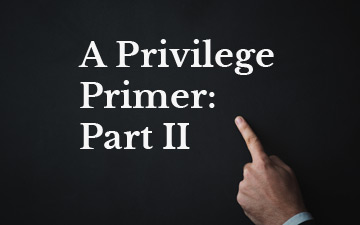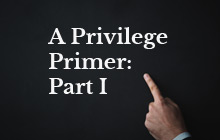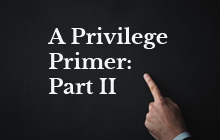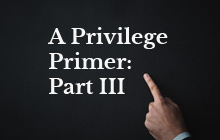A Privilege Primer, Part II: Where do accountants fit in under existing Canadian law?

In the second of a three-part series on the Gaudreau case before the FCA in Quebec, Brian Studniberg of Henein Hutchison Robitaille LLP examines the settings in which an accountant’s work product could be protected by legal privilege
 |
Brian Studniberg is a partner at Henein Hutchison Robitaille LLP where his practice focuses on tax disputes in both civil and criminal matters including with the Canada Revenue Agency and before the courts. |
IN the first part of this series, a recent Tax Court of Canada decision was used as the prompt for considering whether a taxpayer could be required to produce the analysis of professional accountants on the tax characterization of a transaction the taxpayer had undertaken. But while Gaudreau c. Le Roi, 2023 CCI 115 (currently under appeal) is an interesting case, a full understanding of how the issue might be more thoroughly addressed in future tax controversies or other legal disputes requires a wider look at how existing legal frameworks in Canadian law could be deployed to address situations involving accountants providing tax analysis to their clients.
What follows is an overview of some of the different types of settings in which an accountant’s work product could be protected by legal privilege. Because the way the law plays out here can be fairly nuanced, accountants would be advised to seek legal counsel as appropriate to their unique situations. And, no, that is not a contradiction as against the theme of this series. (To find out why, dear reader, you’ll have to tune in again here for the concluding third part of this trilogy.)
A Privilege Typology
Starting at the beginning, privilege can be understood as the right of a party to a legal dispute to refuse to disclose a document or to refuse to answer questions on the ground of a special interest recognized by law. Information that is privileged, although it may be relevant and otherwise admissible evidence, can be withheld in legal proceedings.
Parties have reasonable expectations of privacy in many different types of discussions. Sometimes these lead to the belief that the communications are to remain confidential. And that could include the view that a client’s communications with his or her accountant are presumptively confidential as a matter of the accountant’s professional obligations, such as those under CPA Ontario’s Code of Professional Conduct (see, e.g., Rule 208). However, it is only when communications are privileged that they can be regarded as beyond the reach of evidentiary consideration.
The previous article raised a distinction between a “class” based or blanket form of privilege and a “case-by-case” or situational form of privilege. Solicitor-client privilege is the most common example of a class-based privilege.
Solicitor-client privilege has been described by the Supreme Court of Canada in this way: “Where legal advice of any kind is sought from a professional legal adviser in his capacity as such, the communications relating to that purpose, made in confidence by the client, are at his instance permanently protected from disclosure by himself or by the legal adviser, except the protection be waived.” This is Professor Wigmore’s definition; it was adopted by the Supreme Court of Canada in 1927. (For a more recent reiteration, see R. v. McClure, 2001 SCC 14.)
One point to keep in mind for the later discussion of the extension of solicitor-client privilege to third-party advisors is that the Supreme Court has made it clear that all information a person provides in order to obtain legal advice (and which is given in confidence for that purpose) is sheltered by the privilege. (See Descôteaux c. Mierzwinski, [1982] 1 S.C.R. 860.) In addition, it is not necessary that a particular record specifically request or offer the advice. Rather, as long as it can be placed in what has been called the “continuum of communication” in which the lawyer provides the advice, the communication can be protected from disclosure. (See, e.g., Samson Indian Band v. Canada, [1995] 2 F.C. 762 (F.C.A.).) Finally, another practical observation is that documents originally in the possession of the client (or its other advisors) prior to the consultation with counsel establishing the lawyer-client relationship will not be protected from production. (See General Accident Assurance Co. v. Chrusz, 1999 CanLII 7320 (Ont. C.A.).)
Solicitor-client privilege may be distinguished from litigation privilege. The Supreme Court has described litigation privilege as intended “to ensure the efficacy of the adversarial process and not to promote the solicitor-client relationship. And to achieve this purpose, parties to litigation, represented or not, must be left to prepare their contending positions in private, without adversarial interference and without fear of premature disclosure.” Litigation privilege, then, may include communications made with third parties (so not just a client’s lawyers), but this protection exists only in the context of litigation. A point to emphasize here is that while confidentiality is an essential hallmark of solicitor-client privilege, it is not so essential for litigation privilege: in preparing for trial, a party may obtain information from third parties in circumstances where there is otherwise no expectation of confidentiality. (See Blank v. Canada (Minister of Justice), 2006 SCC 39.)
What matters for litigation privilege is that the documents at issue are brought into existence for the “dominant purpose” of litigation. And unlike the situation with solicitor-client privilege, the protection from disclosure provided by litigation privilege ends on termination of the litigation that gave rise to the privilege.
One question here is whether specialized types of assistance provided by a client’s non-lawyer professional advisors can be protected by the litigation privilege. One might consider as examples valuations or financial analysis. The answer is yes, but the real issue is whether the documents were created for the purpose of preparing for litigation, whether existing or apprehended. (An aside: an interesting question for another day is whether a taxpayer mulling over the potential for reassessment as against a tax position it has taken can establish the necessary degree of contemplation of litigation.)
Settlement privilege is yet another form of legal protection to consider. Documents prepared in the course of negotiations are presumptively privileged where it can be inferred that the communication was made with the intention that it would not be disclosed should the attempt at settlement fail. Actual litigation is not required, but a dispute must exist or be within contemplation. (See Sable Offshore Energy Inc. v. Ameron International Corp., 2013 SCC 37.)
Extending Privilege to Accountants
In establishing a claim of privilege, the onus is initially placed on the party asserting the privilege. Once privilege has been established, however, the burden will then fall on the party seeking to overcome the privilege to establish that the communications should be disclosed. With this in mind, when can a client contend that communications or other documents coming from his or her accountant are properly privileged?
Accountants as the Client’s Representatives for Seeking or Obtaining Legal Advice
The leading case in Canada on the extension of privilege to a client’s other professional advisors is more than 50 years old but continues to be very relevant. In Susan Hosiery Ltd. v. Minister of National Revenue, [1969] 2 Ex. C.R. 27 (Ex. Ct.), the Crown sought a memo prepared by the company’s lawyer, a letter from its auditor to its lawyer, and a letter from its lawyer to its accountants. Based on older English authorities, President Jackett for the Exchequer Court noted that communications between a client and its solicitors or the representatives of the client or its solicitors are privileged. The question then was what the appropriate meaning of a “representative” was. The court accepted that if the representative is engaged by the client as its agent to obtain legal advice, then this person stands in exactly the same position as the client itself.
When someone is engaged by the client, then, the task is to determine whether the person was employed by the client to communicate with the lawyers in obtaining legal advice. Alternatively put, the test per Susan Hosiery is whether it is necessary that the privilege be extended to the communications at issue in order for the client to be free to obtain legal advice. The Exchequer Court accepted that it is not uncommon for an accountant, as the client’s agent, to provide information to the taxpayer’s lawyer or to apply the legal advice given to the taxpayer’s specific fact situation. The Court, however, clarified that, with respect to materials prepared by accountants, no communication made by an accountant falls within privilege unless it was prepared by the accountant as a result of a request by the client’s lawyer to be used in connection with legal advice.
That scenario is illustrated in an even older decision, the Goodman & Carr case (1968 CanLII 340 (ON H. Ct.). Here, communications between the taxpayer and its accountant were subsequently passed on to the taxpayer’s lawyers. These records were held not to be privileged because the documents had not been created at a time when the accountant was acting as an agent, even though these same communications eventually led to the taxpayer retaining counsel. The crucial point was that, at the time the communications were made, no agency relationship was yet in existence.
Accountants as the Client’s Expert
Beyond the situation where the third party is effectively an intermediary between the client and lawyer, a further avenue arises where the third party acts as an expert adjunct to the relationship between the lawyer and client. The leading case here remains Chrusz, where the Ontario Court of Appeal confirmed in 1999 that privilege can attach where the third party is retained to perform “a function which is essential to the existence or operation of the client-solicitor relationship”, a role which must be more than information-gathering from external sources.
Based on this authority, the extension of the solicitor-client privilege could cover an accountant’s working papers which came into existence by reason of the client’s desire to obtain legal advice. In this situation, the accountant speaks not merely as a conduit because the accountant relies on his or her own expertise to explain the complexities of the client’s factual situation and, in so doing, the accountant is acting in a relationship of confidence with the client that itself arises in the context of the professional relationship between lawyer and client.
The case law following Chrusz on the extension of privilege to a client’s other advisors has been clear: To avoid a finding of waiver when a privileged document is provided to a third party such as an accountant (which is really an inference that the document is no longer confidential), the function of the third party must be essential to the giving or receiving of legal advice. This is to say that the third party’s role must in fact be substantive, amounting to more than the mere interposition of the third party. (See, e.g., Minister of National Revenue v. Welton Parent Inc., 2006 FC 67.)
Waiving Privilege
The concept of waiver is worth a brief note. Since privilege exists for the protection of the client, it is up to the client whether to waive privilege. Waiver will ordinarily be established where it is shown that that the possessor of the privilege (i) knows of the privilege and (ii) voluntarily demonstrates an intention to waive it. (See S. & K. Processors Ltd. v. Campbell Ave. Herring Producers Ltd., 1983 CanLII 407 (B.C.S.C.).)
Given that privilege belongs to the client, the client’s advisors (including lawyers working with the client’s other advisors) will owe a duty to claim privilege when applicable. A request from a third party about a professional’s relationship with a former client should be considered in this vein.
Depending on the circumstances, a client’s waiver may be implied which means that waiver can be made inadvertently. Such a waiver may occur, for example, when a document that was intended to remain confidential is disclosed to a third party. Of course, clients may at times decide to deliberately waive privilege, including in responding to the Canada Revenue Agency. As usual, client discretion is advised; consultation with legal counsel can be important insofar as it may be possible to manage or limit the waiver made, and there are also possible exceptions to waiver (such as a common interest).
Finally, there are other exceptions to privilege, such as the somewhat self-evident point that privilege will not cloak communications that are “made with a view to obtaining legal advice to facilitate the commission of a crime”. (See R. v. Campbell, [1999] 1 S.C.R. 565.)
Legal Privilege for Accountants by Extension or Extending Privilege to Accountants?
So what is a client to do when seeking advice from an accountant over which the client wants to be able to claim legal advice privilege? One established approach is to consider a “three-way” engagement by which the client engages a lawyer to provide legal advice; the client engages an accountant to act as the client’s agent for purposes of compiling information and preparing analyses and then to communicate such to counsel; and then all parties sign an acknowledgement describing the intended relationship. Typically the client is warned in such instances that privilege cannot be guaranteed, but the conscious effort to structure the relationship is intended to provide as strong an assurance as possible. That is assuming, of course, that the accountants “stay in their lane”.
Therein lies the rub. Three-way engagements can be valuable, but not every situation necessarily merits the presence of both a lawyer and an accountant. Some case law warns of how tricky it can be to sustain privilege in tripartite situations. (See, e.g., See Redhead Equipment Ltd. v. Attorney General (Canada), 2016 SKCA 115.) And, irrespective, not all clients will be able to afford both sets of professionals.
This article has not spent much time on describing the rationale for legal privilege; instead, it has attended to the more practical matters of outlining the various forms of privilege and how accountants can fit into them as conventionally understood. But a fuller understanding of the why should help make better sense of the how. In the final part of this series, the issue is ducked no longer. As a seminal case like Chrusz makes clear, privilege can attach where the “function” of the third party is essential to the giving or receiving of legal advice. But what happens where there is no third party, and the accounting professional is tiptoeing towards providing legal advice? That’s the situation up next.
Read all three parts in this three-part series:
A Privilege Primer, Part I: Gaudreau reminds that there is no accountant-client privilege in Canada. But why?
A Privilege Primer, Part II: Where do accountants fit in under existing Canadian law?
A Privilege Primer, Part III: Reconsidering accountants’ tax services as legal services
Brian Studniberg is a partner at Henein Hutchison Robitaille LLP where his practice focuses on tax disputes in both civil and criminal matters including with the Canada Revenue Agency and before the courts. Author photo courtesy Henein Hutchison Robitaille LLP. Title image: iStock (modified). To read all three parts in this three-part series, click on the related articles below.





(0) Comments